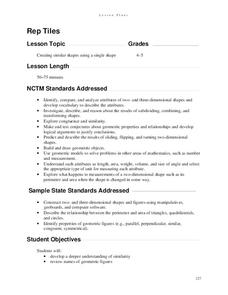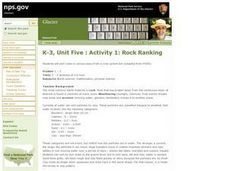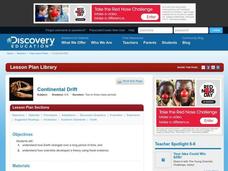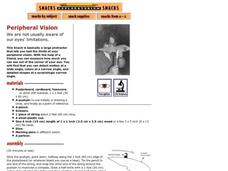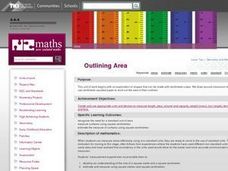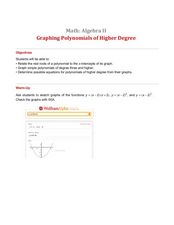Cornell University
Constructing and Visualizing Topographic Profiles
Militaries throughout history have used topography information to plan strategies, yet many pupils today don't understand it. Scholars use Legos and a contour gauge to understand how to construct and visualize topographic profiles. This...
Balanced Assessment
Catenary
Develop a model for a hanging chain. Pupils find a mathematical model for a hanging chain and then they compare their models to the precise function that models the curve. Scholars come up with a strategy to determine how close...
Improving Measurement and Geometry in Elementary Schools
Rep Tiles
In addition to the catchy title, this lesson plan provides upper graders an opportunity to more closely scrutinize the attributes of plane figures. In particular, they focus on the similarity of different shapes. Both whole-class and...
Curated OER
Flexible "Glass" Sculpture
Older artists create 2-dimensional surfaces with paint, then use these paintings as the components of a 3-dimensional sculpture. They assemble a free-standing sculpture that may be viewed from any angle by using wire to create the shape....
Curated OER
Applied Science - Science and Math Lab
Students investigate topology. In this Applied Science lesson students explore higher, more abstract mathematics using tangles. Students make topologically related shapes.
National Park Service
Rock Ranking
Junior geologists sort rocks and soil. They separate a sample of river gravel by size, shape, color, and other characteristics. To include Common Core standards, you could have little ones graph the number of particles in each sample.
Curated OER
Signs and Symbols
Sixth graders carefully analyze a triptych of the nativity, paying close attention to the lines, shapes and symbols included in the artwork. They explore the role of the Catholic church in society at the time the piece was created and...
Curated OER
Georgia O'Keefe - A Unit for Grades 9-12
SStudents view examples of O'Keef's work and watch a video about her life. They use colored pencil to create a 6" x 6" reproduction of a 2" x 2" square cut from a magazine picture, finding and using the most interesting shapes in the...
ARKive
Nocturnal Animals
How do those nocturnal animals see in the dark? This perplexing question does have an answer. First, little ones use their sense of touch to determine the name of a mystery object, then they listen closely to identify various animals by...
Newseum
Today's Front Pages
Take a close look at a number of newspapers with collection of lessons and activities. Using a poster (which can be found under the materials tab), learners examine the hard copy of a local newspaper. This leads into an exploration of...
Chicago History Museum
Reading Artifacts
History detectives put their keen observation skills to the test as they closely examine artifacts. Drawing on visual and tactile clues, they formulate a theory about who done it, or in this case who made it, why, and for what...
National Endowment for the Humanities
In Emily Dickinson's Own Words: Letters and Poems
Analyze the depth and beauty of American Literature by reading Emily Dickinson's letters and poems. The class analyzes Dickinson's poetic style and discusses Thomas Wentworth Higginson's editorial relationship with Dickinson. They pay...
Curated OER
Summer Shorts
Want to use sequence maps in your narrative writing unit? Young writers work to create personal narratives about their summer vacation. They write a narrative of their vacation and create a display using summer clothing shapes made from...
Curated OER
Physical Changes and States of Matter - Two
Here's a wonderful lesson on how substances change states. Groups of learners are given trays with a chocolate bar, a piece of paper, an ice cube, and a balloon. During the activity, the groups closely observe the changes that each...
Curated OER
Continental Drift
Be sure to come prepared to discuss the theory of Pangaea and the two super-continents, Laurasia and Gondwanaland. Collaborative learners look for fossil evidence that supports the theory that one super-continent divided into two. They...
Exploratorium
Peripheral Vision
Life science learners discover the range of peripheral vision. They compare the angles at which they can detect motion, colors, and detailed shapes.
EngageNY
Are All Parabolas Similar?
Congruence and similarity apply to functions as well as polygons. Learners examine the effects of transformations on the shape of parabolas. They determine the transformation(s) that produce similar and congruent functions.
Brown University
The Candidates and Their Values: Election 2016
Voting for the next president of the United States is about finding the candidate who most closely aligns with your own values and sense of democracy. High schoolers become acquainted with the candidates from the 2016 election with a...
Statistics Education Web
Using Dice to Introduce Sampling Distributions
Investigate the meaning of a sample proportion using this hands-on activity. Scholars collect data and realize that the larger the sample size the more closely the data resembles a normal distribution. They compare the sample proportion...
Illustrative Mathematics
Distance across the channel
Here you will find a model of a linear relationship between two quantities, the water depth of a channel and the distance across the channel at water level. The cross section of the channel is the shape of an isosceles trapezoid. The...
Howard Hughes Medical Institute
Stickleback Evolution Virtual Lab
How quickly do animals evolve? Can comparing different samples of the same fossil answer timeline questions? Scholars use virtual labs to examine fossils and learn about stickleback evolution. They compare pelvic morphology in lakes...
Curated OER
Farm Animals-Cows, Pigs, Horses
Here is a good lesson for kindergartners that combines technology, literature, and art. In it, learners take a close look at some famous farm animals. They make the sounds that each animals makes, they use the internet to find pictures...
Curated OER
Outlining Area
Explore measuring various objects using square centimeters. Learners create various shapes using five centimeter cubes, calculate the area in square centimeters of different classroom objects, and discover who has the largest mouth,...
Curated OER
Graphing Polynomials of Higher Degree
Using Wolframalpha graphing capabilites, algebra learners graph polynomials with degrees of three and larger. They identify the roots and graph each polynomial, predict zeros and shapes of graphs, and validate their understanding through...


